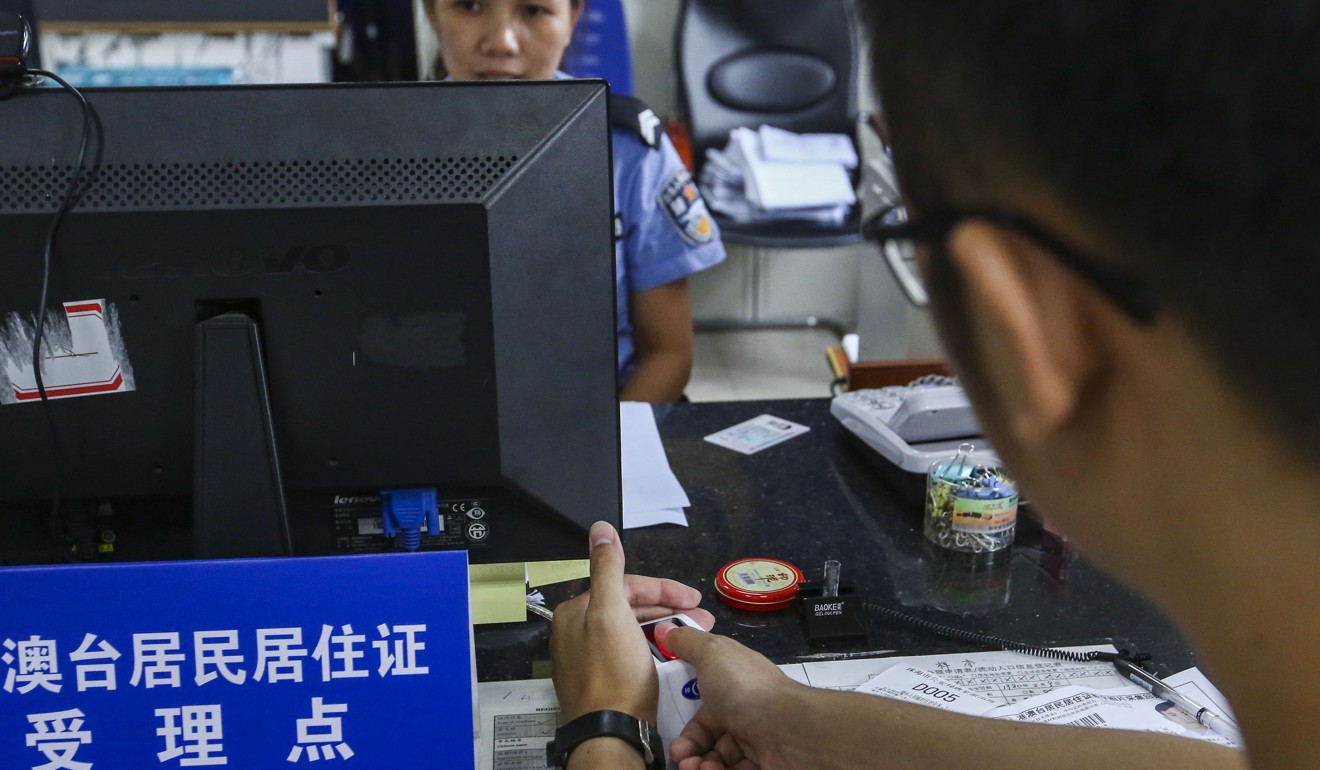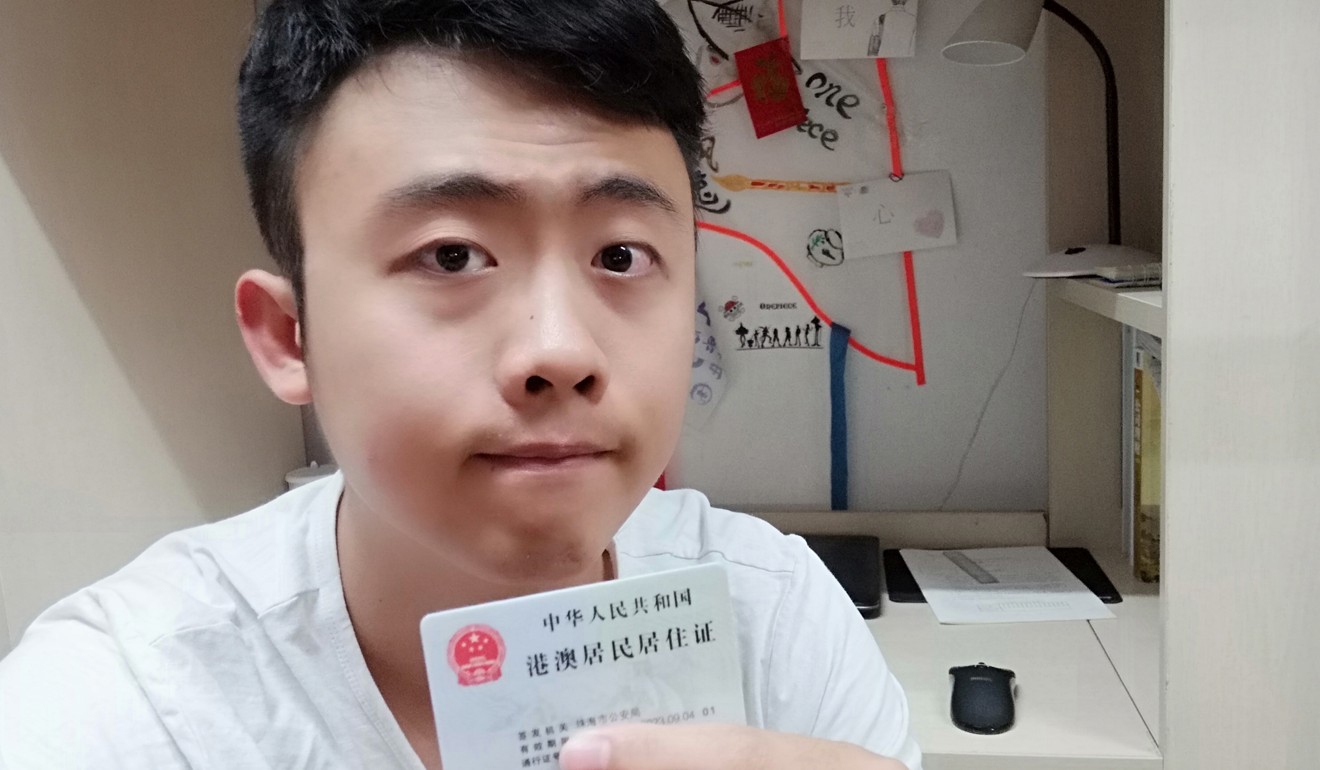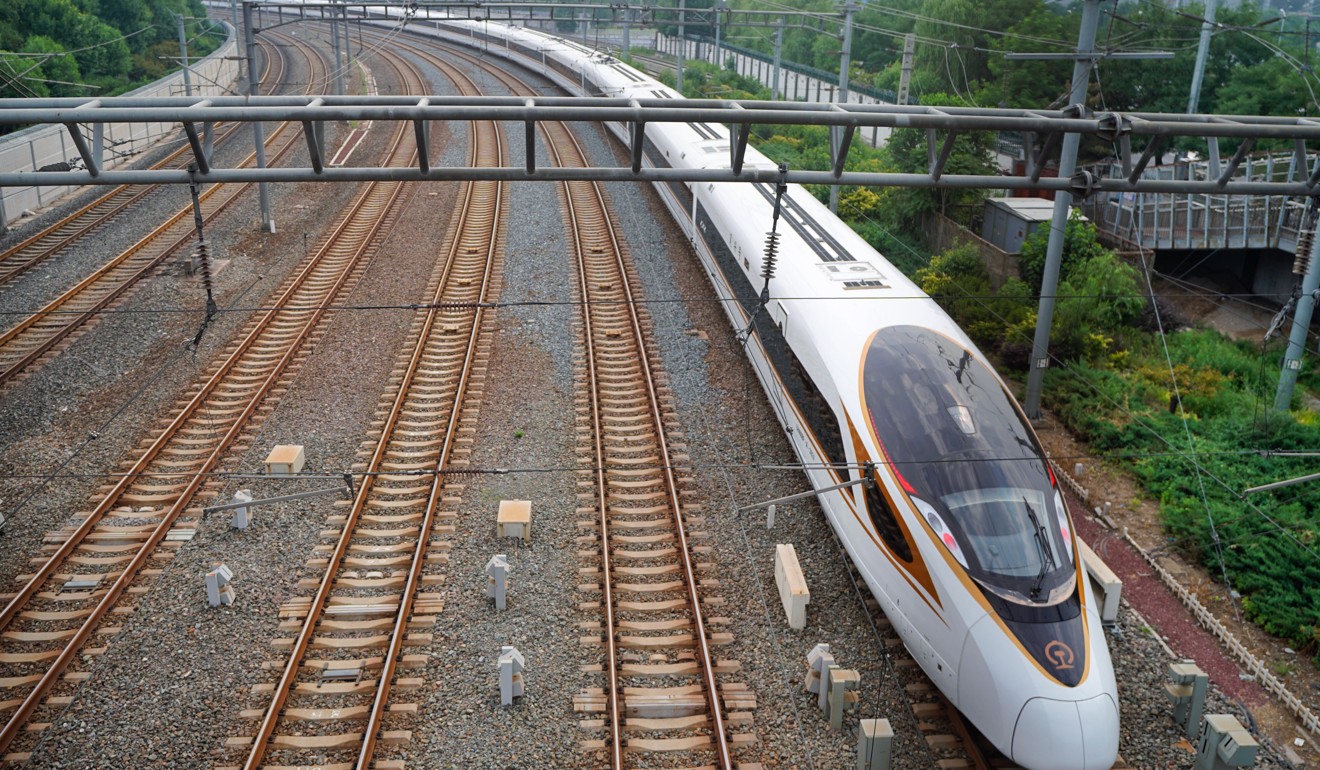
Users flaunt new ID card for Hong Kong, Macau and Taiwan residents in mainland China, but not all services updated to accept permit
Holders of residence permit report successful driving licence applications but other services ranging from mobile payments to hospital registration not up to speed
Hongkonger Patrick Ho was so pleased to receive his new mainland identity card that he took a selfie with it and posted his picture on WeChat, China’s most popular mobile messaging application.
“One of the first to try the crabs,” he boasted, using the Chinese expression for being the first to try something new.
A university student in Zhuhai, Guangdong, he was among the first to apply for the residence permit which promises mainland residents from Hong Kong, Macau and Taiwan easier access to a wide range of social and public services.
But when he tried to update his user information for Alipay’s mobile payment service using the smart card, he was told the system was “not ready” to accept his new permit.

Like many other early users of the smart cards, Ho discovered that some private and government electronic systems are not yet ready for the new residence permits.
An Alipay online customer service officer told him that its identity verification process relied on cross-checking by the mainland’s public security authority. So far, however, the authority had not included the new smart card in its cross-checking service.
New ID card will give Hongkongers access to public services on mainland
To confirm the identity of clients not based on the mainland, Alipay accepts passports and travel permits to the mainland.
A spokeswoman said the company, which has 870 million active users worldwide, was still preparing to add the new residence permit to its verification process. Alibaba also owns the South China Morning Post.
Similarly, a Zhuhai People’s Hospital staff member told the Post its online appointments system did not recognise the residence permit.
“You’ll need to go to a counter in our hospital and have your permit linked with your account,” the employee said.

Ho received his permit four weeks after applying for it on September 1, the day applications opened.
Mainland authorities have not disclosed the total number approved so far, but state news agency Xinhua reported on September 14 that Zhuhai received more than 2,100 applications, including about 1,000 from residents of neighbouring Macau.
About 520,000 Hongkongers live in Guangdong alone and more than 15,000 Hong Kong students attend universities across the mainland.
The residence permit is for people from Hong Kong, Macau and Taiwan who have been living, working or studying on the mainland for at least six months.
The smart ID card is supposed to give them the same access as mainlanders to 18 public schemes and services, spanning employment, social insurance and housing fund schemes, as well as education and basic medical services.
The smart card’s 18-digit code, similar to that on mainland Chinese citizens’ ID cards, also allows easier access to various public and private services systems.
The code starts with “810000” for those from Hong Kong, “820000” for those from Macau, and “830000” for those from Taiwan.
Like others who applied early for the smart card, Ho was drawn by the convenience not provided by his home return permit, the cross-border travel document issued by mainland authorities for Hong Kong and Macau residents.
Applications set to open for new mainland ID card – and some can’t wait
For example, taking a train is much simpler for mainlanders who simply tap their smart cards at departure gates, whereas others must wait in long queues to get their tickets printed before boarding.
Ho will have to wait to use his new smart card to take a train. New ticketing rules announced by the China Railway Corporation earlier this month stated that the residence permit was not yet accepted by its ticketing machines or for telephone bookings.
But Michael Chen, 19, who is from Macau and studying in Beijing, got his permit authorised for ticketless boarding at Hangzhou East Station in Zhejiang province.
“I bought a high-speed train ticket to Beijing online with my permit and got the card authorised at a manual counter in the station,” Chen said.

It was his application for credit cards which ran into problems. Previously, card applications on the mainland were usually not accepted with home return permits. Chen had tried to apply for a credit card using his new permit on the first day of receiving it, at the Beijing branches of three state-owned banks – the Industrial and Commercial Bank of China, China Construction Bank and Agricultural Bank of China.
But none of the banks accepted his applications.
Unlike Ho and Chen, Hongkonger Lau Yee-man, 22, a designer working in Guangzhou, was successful when she used the residence permit she received by mail on September 24, almost a week earlier than expected.
The first thing she did was to apply for a driving course and her card was accepted by the school without any problems.
“The school will help me complete the registration for exams at the vehicle and traffic administration department,” she said.
Hongkonger Chan Sung-kuen, 22, was not as lucky when he arrived at his Guangzhou hotel after midnight on Tuesday at the start of a five-day holiday.
He could not check in because his smart ID card was not accepted by the hostel.
“I was so disappointed,” said Chan, who is a student in Beijing. “Didn’t the authorities say the permit was produced in the same way as the mainlanders’ ID card? Shouldn’t the permit be recognised by card readers designed to read mainlanders’ cards?”
I was so disappointed ... Shouldn’t the permit be recognised by card readers designed to read mainlanders’ cards?
His 18-digit code was rejected by the hostel’s registration system for being in the “wrong format”.
The hostel asked Chan to obtain written proof of his identity from a nearby police station but officers there told him they could not locate his profile using both his residence permit and his home return permit.
“Systems of private companies might be late in terms of updating, but what excuse could police have?” Chan asked.
An officer at the station that Chan visited told the Post that “normally” their system should be able to locate a holder’s information with the residence permit number. “But it may take a longer while,” the officer said. “The amount of data we have to update in the system is not small.”
The Ministry of Public Security in Beijing has not responded to inquiries sent by the Post on October 3.
The hostel allowed Chan to stay for the night, but he had to cancel his reservation for the remaining four nights and pay 500 yuan (HK$570) more to move to another hotel which could accept his home return permit.
Chan also ran into problems while trying to take high-speed trains on the mainland.
New smart ID card application to take just 30 minutes from this year
He was told that if he wanted to update his information for the online ticketing system, he would have to nullify his existing account at a railway station and then go online to register a new account.
He followed those instructions, but when he went online to register again with his new smart ID card, his application was rejected.
Cheong King-yau, another Hong Kong student in Beijing, tried unsuccessfully to use his new residence permit to register an account with Jingdong, mainland China’s second largest e-commerce company.
“When I put in the permit number, the system indicated it couldn’t support that document yet,” he said.
Over in Zhuhai, meanwhile, student Ho remained patient and confident that life on the mainland would become more convenient.
“It has been only one month, many systems may not be ready,” he said. “I have just got the card and have not tried it out elsewhere.”

